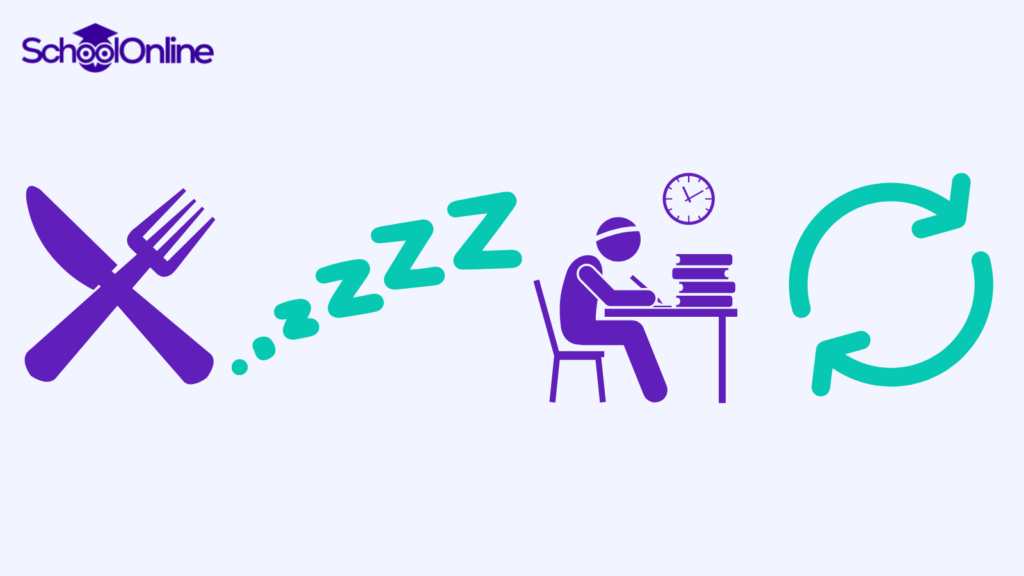Not many people look forward to revision, but unfortunately, there is no getting away from it – if you want to achieve the results that a year of hard work absolutely deserves, then you are going to need to revise. A lot.
It will probably feel like revision is taking over your life, and that is probably because it is! You can feel like you are losing control a little bit, but take a deep breath and relax, because we’re here to help.
The title of this piece “Eat, Sleep, Revise, Repeat” has become a bit of a catchphrase for the pre-exam phase, articulating the relentless grip that it holds over the lives of students.
There is more to it than that though – these are the four main factors of revision life, and each one, if done correctly, can help to lay the foundations of a really successful exam period.
I can hear you already: “surely the revision part is the most important bit – shouldn’t we just focus on that?”. It’s an easy trap to fall into – just bury yourself in the books for weeks on end, but it really isn’t the best way to go about things.
It’s all about balance – so let’s have a look at each of these four factors and what you can do to help you fulfil your potential in your forthcoming exams.
Eat – Brain Food
It’s one of those things that we all know, but can never really be bothered to pay much attention to. Eating healthy food is good for both our body and our mind.
We are not saying that you need to live off beans and pulses for months on end – you don’t want to be making huge alterations to your diet on top of everything else you are thinking about! What we are talking about is little adjustments that can help your brain function that little bit better, and help you concentrate for longer. Things like:
Eat breakfast: This isn’t news, but eating breakfast will kick start your body and mind into life. When you wake up, it is likely that you have gone 10-12 hours without food – your glucose levels are low. Your brain needs glucose to function. By eating breakfast we send new waves of glucose to our brains, and we can then focus and concentrate for longer.
Drink water: Your brain is around 75% water – if you cut off the supply then your brain cells start to get a bit sluggish. Drinking plenty of water will prevent this from happening – meaning that your memory is working to full capacity.
(Healthy) Snacks!: Have you heard the phrase ‘Hangry’? When you start to get hungry, you become irritable – everyone does (studies have shown that even Judges give much harsher verdicts just before lunch!). Don’t let that get in the way of your revision – have plenty of snacks on hand. Nuts, fruit, olives and yoghurt are all great options.
Keep treats as treats: We’re not saying you can’t have those little treats that make you happy of course. But try to incorporate them into your revision – make yourself earn them. Successfully memorise a list of facts? Have a cupcake. Get a good score on a practice exam paper? Treat yourself to a pizza for dinner. Be creative, and add a little more short-term motivation to your revision sessions.
Sleep – Convert Z’s into A’s
Feel a bit groggy in the mornings? Trust me, you are not alone, but it probably means that you need to get more sleep.
Easier said than done, right? You have enough going on in your head with all the facts and figures that you have been learning, but without decent sleep, you will struggle to retain a lot of what you have been learning.
Obviously, when you are tired you are going to find it harder to concentrate, but did you know that when you are asleep your brain is awake and sorting through memories from the day. This means that if you get a good night’s sleep after a day of revising, you are likely to retain a lot more of the information than if you ‘pull an all nighter’.
So how can your sleep improve your revision? Here are our top tips:
- Wind down between study and sleep – listen to music or have a bath, whatever it takes to switch off before you get into bed.
- Reduce screen time – try to use your phone/tablet less before bed, and if you must use it, use the blue light filter.
- Fight the urge to cram – studying late at night won’t help you as much as a good night’s sleep.
- Power nap – if you are struggling to concentrate on work during the day because you are tired – have a nap. Set an alarm (keep it to under 30 minutes) and lie still in a comfy bed.
Revise – Study the Art of Studying
There are countless resources out there to help you to work out the most effective way to revise – the best ones just happen to be on this site!
The important thing is that you make the most of your time when revising. Sitting in front of a book, just highlighting chunks of text, won’t maximise your efficiency. You’ll get bored and less information will go in before too long.
There are too many techniques to list them all here, but there are some golden rules:
- Take regular breaks
- Create a nice, quiet, calm environment to work in
- Set out a proper plan for your revision, and stick to it
- If there is something you are really struggling with, ask for help
- Test yourself regularly
- Experiment with different revision methods to keep it fresh
- Repeat – Repeat and Repeat
- Humans are creatures of habit, and you need to use that to your advantage
- Use award winning platforms that will guide you to exam success like SchoolOnline. Start today and improve your grades up to 100.5% in a matter of weeks!
Eat, Sleep, Revise, Repeat
Once you have developed the good habits of the topics above – you are eating well, sleeping well and revising well, you do it again. And again. And again (You get the picture).
Repetition works on a number of levels when it comes to revision. First of all, we get into good habits if we do the same thing a few times – sleeping well, eating well and good study habits will benefit us long after the exams are all out of the way. Establishing these now will benefit you for the rest of your life.
It has also been established that repeating a good revision plan, with different topics covered, over and over again will benefit us much more than just focussing on one topic at a time. We learn things, nearly forget them, and then relearn them again. The more we repeat this process, the more that sticks each time.


